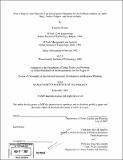| dc.contributor.advisor | Alice H. Amsden. | en_US |
| dc.contributor.author | Kumar, Rajendra, 1967- | en_US |
| dc.contributor.other | Massachusetts Institute of Technology. Dept. of Urban Studies and Planning. | en_US |
| dc.date.accessioned | 2008-09-03T15:06:28Z | |
| dc.date.available | 2008-09-03T15:06:28Z | |
| dc.date.copyright | 2007 | en_US |
| dc.date.issued | 2007 | en_US |
| dc.identifier.uri | http://hdl.handle.net/1721.1/42260 | |
| dc.description | Thesis (Ph. D.)--Massachusetts Institute of Technology, Dept. of Urban Studies and Planning, 2007. | en_US |
| dc.description | Page 225 blank. | en_US |
| dc.description | Includes bibliographical references (p. 210-216). | en_US |
| dc.description.abstract | Emergence of India as a major center in the world for software production since the early 1990s has been a remarkable success story of economic development. However, within the country, the growth in this industry has been concentrated in mainly the southern and the western parts. Regional growth of this industry has been driven by the policies of the regional governments, especially after the early 1990s when the central government initiated wide-ranging economic and policy reforms. In this dissertation, I examine the development strategies pursued by three states in southern India for development of this industry within an overall neo-liberal policy framework of the central government. Two of these states (Tamil Nadu and Andhra Pradesh) have been highly successful in attracting software firms since the mid 1990s, while the third state (Kerala) has lagged behind. I argue that the success of these states in establishing a technologically sophisticated industry within a short time is based on four critical factors: availability of adequate skilled labor and specialized infrastructure, pro-employer labor and policy reforms, ethnic linkages of immigrant professionals abroad who returned to establish firms in their native states, and their existing technological capabilities at the beginning of reforms. In a liberalizing economy, these states provided specialized infrastructure and skilled labor; implemented pro-employer policy reforms; attracted expatriate professionals; and facilitated production and marketing linkages between the local firms and foreign markets. This allowed the local firms to exploit the opportunities due to increasing vertical specialization by firms in the developed economies. | en_US |
| dc.description.abstract | (cont.) While the influence of dominant class coalitions consisting of industrialists and professionals in Tamil Nadu and Andhra Pradesh ensured the success of these policies, the relatively autonomous nature of the state in Kerala, its lack of genuine labor and policy reforms, its distrust of large private enterprises, and its focus on redistribution rather than growth prevented it from achieving similar success. Contrary to common explanations in the literature, the state has not played a significant role in providing specialized R&D or finance to the industry. This research shows that developing regions have multiple options available to them to promote hi-tech industries even within an overall neo-liberal policy framework. | en_US |
| dc.description.statementofresponsibility | by Rajendra Kumar. | en_US |
| dc.format.extent | 225 p. | en_US |
| dc.language.iso | eng | en_US |
| dc.publisher | Massachusetts Institute of Technology | en_US |
| dc.rights | M.I.T. theses are protected by
copyright. They may be viewed from this source for any purpose, but
reproduction or distribution in any format is prohibited without written
permission. See provided URL for inquiries about permission. | en_US |
| dc.rights.uri | http://dspace.mit.edu/handle/1721.1/7582 | en_US |
| dc.subject | Urban Studies and Planning. | en_US |
| dc.title | Rise of regions after reforms : late development strategies for the software industry in Tamil Nadu, Andhra Pradesh, and Kerala in India | en_US |
| dc.type | Thesis | en_US |
| dc.description.degree | Ph.D. | en_US |
| dc.contributor.department | Massachusetts Institute of Technology. Department of Urban Studies and Planning | |
| dc.identifier.oclc | 231761584 | en_US |
